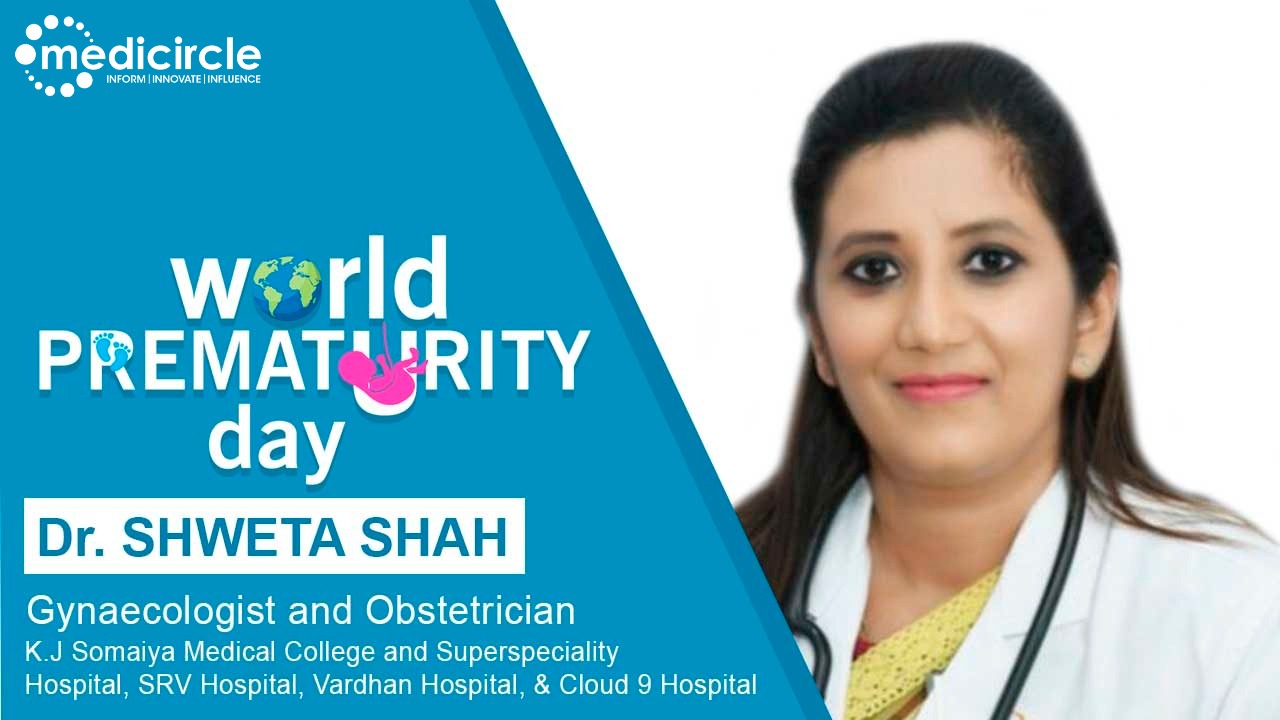Preterm birth is when a baby is born too early before 37 weeks of pregnancy have been completed. Premature birth is a very serious health problem and a leading cause of death among children younger than five years worldwide. Premature babies have more health problems than babies born on time and may experience long-term health problems that affect the brain, lungs, hearing or vision. Worldwide, more than 1 in 10 babies are born prematurely each year, resulting in an estimated 15 million preterm births per year. Across 184 countries, the rate of preterm birth ranges from 5% to 18% of babies born. In India, out of 27 million babies born every year (2010 data), 3.5 million babies born are premature and over 300,000 of these preterm babies die each year because of associated complications.
The World Prematurity Day is annually observed on November 17th to raise awareness about this serious health crisis. On this day, several webinars and events are being conducted to highlight the critical importance of neonatal care during this vulnerable period of life. We at Medicircle are conducting the World Prematurity Day Awareness Series wherein we will be featuring experts in this field to understand and create more awareness about premature birth.
Dr Shweta Shah is one of the best gynaecologists and obstetricians in Mumbai. Dr Shweta Shah works at K.J Somaiya Medical College and Superspeciality Hospital. She also offers low-cost laparoscopic surgeries to her patients at SRV Hospital, Vardhan Hospital, & Cloud 9 hospital. She has treated numerous women patients with infertility, gynaecological issues, and menopausal issues with great success. She has been awarded the first prize in the category of surgical video presentation on laparoscopic management of ureteric endometriosis at the International E- Conference organized by FOGSI & SEUD (Society of Endometriosis and Uterine Disorders), March 2021. She has also been awarded N. A Purandare prize for best paper presentation on Cancer Care in Peripheral Hospitals organized by Mumbai Obstetrics and Gynaecology Society, 2015.
Causes of Premature Birth
Dr Shah begins, "The first cause of premature birth is infection during the pregnancy. Any minor or major infection if left untreated can cause premature birth. These infections could be upper respiratory tract infection, diarrhoea, cough, cold and even dental infection can cause premature birth."
"Other causes are if the pregnant woman is suffering from diabetes, BP, kidney or heart disease or low haemoglobin (anaemia in pregnancy). If care is not taken of the women's diet then that too results in premature birth. Smoking, alcohol and tobacco consumption to cause premature birth."
How common are premature births?
Dr says, "Premature births are very common. Globally, on average 5 to 18%, births are premature. In India, where proper medical facilities are missing, the rate of premature births is 12 - 14%."
How to take care of premature babies?
Dr Shah explains, "When a premature baby is in the NICU, proper care is administered by doctors and nurses. When the baby comes home, it is important for the parents to take extreme care of the baby."
"The first thing to note is about breastfeeding. Mother's milk is the best thing for the baby. For preterm babies, mother's milk is really beneficial. It helps them gain better immunity, fight diseases, helps in brain development and can even prevent the risk of developing diabetes and obesity."
"Premature babies could find it difficult to latch properly onto the mother. Here what the mother should do is remove her milk manually or by a pump and feed the baby using a clean spoon and cup. The important thing is to use mother's milk only."
"Preterm babies also require skin-to-skin touch. They find it difficult to adjust to the room temperature. That is why doctors recommend them to have skin-to-skin care or Kangaroo Mother Care. This care can be provided by any caregiver, be it the mother, father or anyone else. This close contact can help babies be warm and develop their brains."
"The third thing is that since the babies are little they don't have enough energy to spare. They must hence sleep longer. From our side, there should be minimal disturbance. Make sure that there are fewer people that meet the baby. This will restrict the spread of infections and make the baby grow healthy and better.”
“When the child is kept under NICU, even the mother is not allowed to touch the baby. Since these babies are premature, they have a weaker immunity. This makes them susceptible to catching more diseases and infections. If handling the baby is necessary, make sure to have clean hands.”
Is Prematurity fatal?
Dr answers, “Yes, prematurity can be fatal. But it depends on the weight and gestation period in which the baby has been born. When a baby is born within 37 weeks that make him/her a prematurity baby. This 37 week-long period again is divided into 3 parts. The first is the period between 28 to 32 weeks; 32 to 34 weeks and 34 to 37 weeks.”
The babies born within 34 to 37 weeks usually perform well. In some instances, they don’t even require NICU. Babies born between 32 to 34 weeks require more care and more time in NICU. The fatal category is weeks 28 to 32.”
“Another thing to note is that there has been advancement in the field of medicine. Earlier the delivery would take place in one’s own house. There were no NICUs and other facilities. But now with so many advancements, there is improvement in the fatality rate.”
(Edited by Priyal Shah)

 Without proper care, premature delivery can turn fatal for the babies. Learn the three ways this can be avoided with the advice of a Gynaecologist on World Prematurity Day.
Without proper care, premature delivery can turn fatal for the babies. Learn the three ways this can be avoided with the advice of a Gynaecologist on World Prematurity Day.









.jpeg)

















.jpg)


